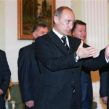
SHANGHAI COOPERATION ORGANIZATION EYES ECONOMIC, SECURITY COOPERATION
Publication: Eurasia Daily Monitor Volume: 2 Issue: 202
By:

As top officials from the Shanghai Cooperation Organization (SCO) gathered in Moscow on October 26, they reiterated earlier pledges to expand economic ties in Central Eurasia. The meeting also confirmed the SCO’s ambitious goal of becoming a major global player.
Prime ministers from member states Russia, China, Kazakhstan, Kyrgyzstan, Uzbekistan, and Tajikistan, as well as top officials from observer states, including Pakistani Prime Minister Shaukat Aziz and Indian Foreign Minister Natwar Singh, attended the SCO meeting in Moscow. The officials inked agreements on strategies for responding to emergency situations and on inter-bank cooperation; they also approved the SCO budget for 2006.
Russian Prime Minister Mikhail Fradkov hailed the SCO “road map,” a blueprint for expanding multilateral trade and economic ties (Itar-Tass, October 26). The Inter-bank SCO Council was created to fund future joint projects, although no details of the planned ventures were released at the meeting. However, SCO Executive Secretary Zhang Deguan said the SCO would prioritize joint energy projects, including the expanding oil and gas sector, exploration of new hydrocarbon reserves, and joint use of water resources.
Meanwhile, bilateral economic ties between Russia and China are emerging as the core of a future SCO development. Russian President Vladimir Putin and Chinese Prime Minister Wen Jiabao reportedly agreed that bilateral trade turnover might exceed $28 billion this year. “I hope this happens,” Putin said.
Wen said China prioritizes bilateral relations with Russia. The two countries have started strategic security consultations, approved a border agreement, and held a joint military exercise. Furthermore, Wen suggested boosting ties with the SCO and another Russia-dominated post-Soviet grouping, the Eurasian Economic Community (EEC). He also pledged to further expand China’s program of export loans to SCO states, which is currently estimated at $900 million (Interfax, RIA-Novosti, Xinhua, October 26-27).
However, the SCO is understood to be mulling ambitious global goals, well beyond plans for expanding economic ties. “The SCO has gone beyond the framework of its initially stated goals,” Putin said when greeting the SCO prime ministers at the Kremlin. He reiterated that the combined population of the SCO member states and observer countries exceeds 3 billion people. Therefore the SCO leaders are in a unique position to work out decisions that affect the majority of the global population. “It is a significant factor of global politics,” Putin said (RIA-Novosti, Interfax, October 26).
The Moscow meeting came as an indication that further SCO expansion may be on the horizon. Pakistan’s Prime Minister Shaukat Aziz revealed plans for his country to join the SCO eventually. “We aim at becoming full members of the SCO, of course,” he told journalists in Moscow. In particular, Pakistan prioritizes economic and anti-terrorism cooperation within the SCO, Aziz said (Interfax, October 27).
Reflecting the SCO’s global ambitions, the Moscow summit also dealt with issues of Eurasian stability and security. Kazakhstan is particularly interested in the SCO’s foreign policy priorities, and Kazakh Prime Minister Daniyal Akhmetov noted, “The SCO guarantees stability in the region” (Kazinform, October 26).
The Russian media took notice of the SCO security agenda. Russian diplomats no longer deny that there are any military aspects to the SCO, Nezavisimaya gazeta commented. The Russian special envoy to the SCO, Vitaly Vorobyov, conceded that the SCO Charter involves defense cooperation, although he ruled out turning the SCO into a military bloc. However, the newspaper suggested, this change of rhetoric arguably indicates that Washington has reason to be worried (Nezavisimaya gazeta, October 27).
Yet Russian officials have been keen to dismiss suggestions that the SCO countries were banding together to oppose the United States. The SCO is open for anti-terrorism cooperation with other international organizations, Fradkov told the journalists in Moscow. “We are rather ‘pro’ than ‘contra’,” he said (Interfax, October 26).
Citing a recent Christian Science Monitor article, Konstantin Kosachev, chair of the Duma Committee on International Relations, claimed many American analysts believe that “anything happening in the world without the U.S. is done against the U.S.” In its October 26 edition, the Christian Science Monitor speculated that Russia and China were about to form a Eurasian military grouping to rival NATO.
SCO officials echoed Russian denials. “The SCO will never become a military bloc, this is not our intention, it is not our aim,” SCO executive secretary Zhang said. “What we are doing now is not aimed at turning the SCO into an isolated bloc, political or military.” The SCO call for the U.S.-led coalition forces in Afghanistan to announce a timetable for withdrawal “was not an ultimatum” (Interfax, October 27).
At the SCO summit in the Kazakh capital, Astana, in July 2005, the leaders of the organization suggested that the U.S.-led coalition forces in Afghanistan should announce a timetable for withdrawal and demanded a limit to outside interference in the region’s internal affairs.
The Russian media commented that the SCO meeting in Moscow seemed to be a publicity exercise for the Kremlin, a perceived attempt to showcase its global importance. Kommersant (October 27) noted that President Putin took pride in reminding that the SCO represented the larger part of mankind, while Izvestiya (October 27) also noted that Putin had gathered half of the planet at the Kremlin.




